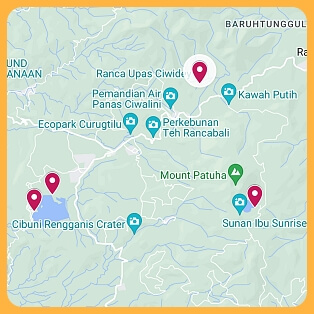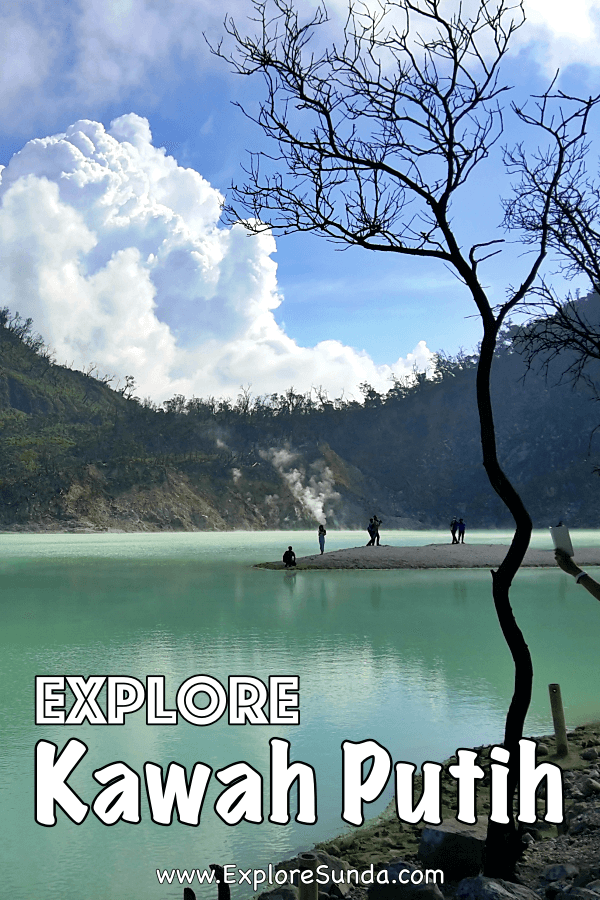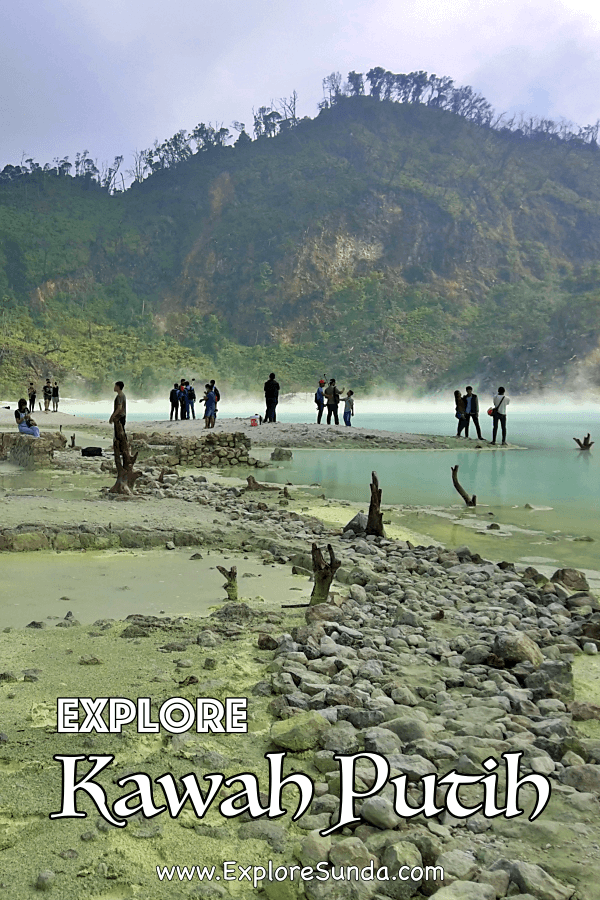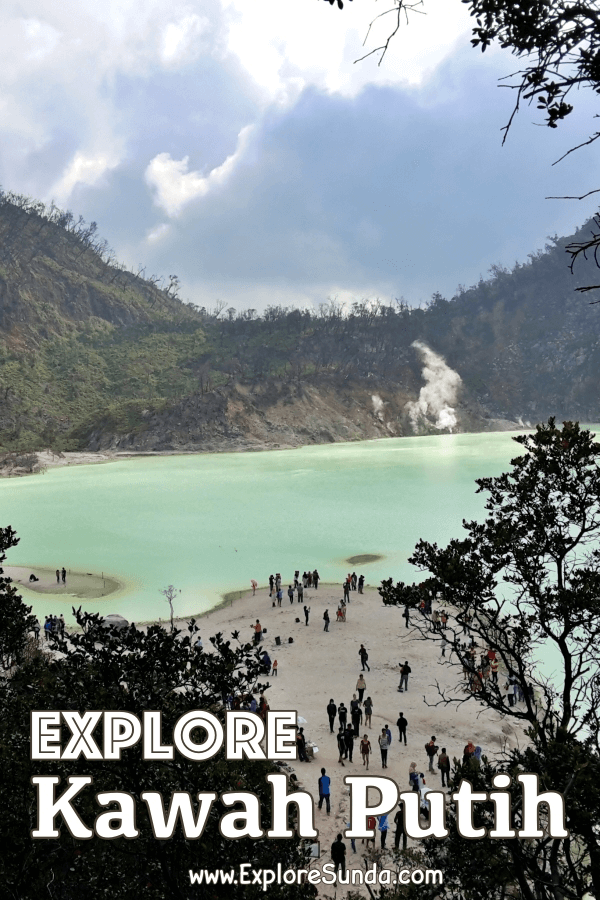Kawah Putih
The Best Crater in Ciwidey Bandung
Kawah Putih, or White Crater in English, is a breathtaking volcanic lake located in Ciwidey, approximately 47 km south of Bandung. It is one of the two famous craters in West Java, the other being the Tangkuban Parahu craters in Lembang.
Both craters are easily accessible by foot from the parking lot. However, there is a difference between the two. You can walk on and even boil eggs in the Domas Crater of Mount Tangkuban Parahu. On the other hand, the Kawah Putih crater has transformed into a lake with an astonishing view. The lake is a mixture of white and greenish colors, surrounded by a white sandy beach and limestone cliffs.
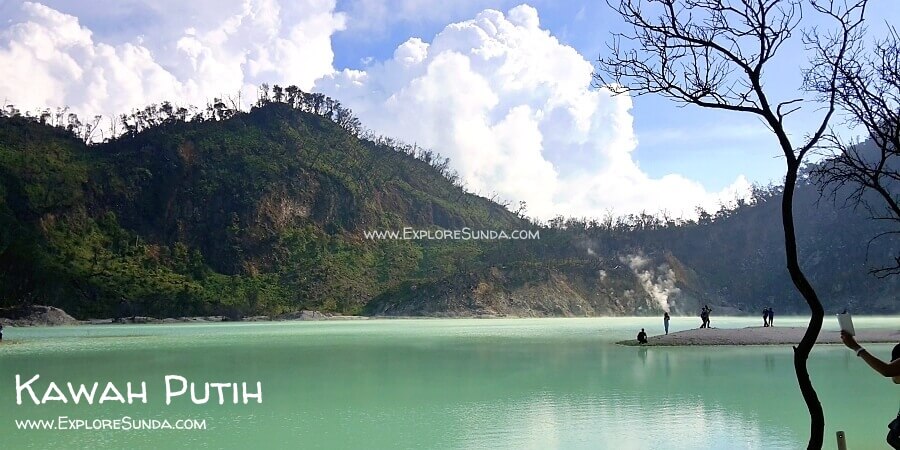 Kawah Putih, the famous volcanic lake on Mount Patuha, Ciwidey.
Kawah Putih, the famous volcanic lake on Mount Patuha, Ciwidey.As most of the Kawah Putih crater is submerged underwater, the scent of sulfur is not overpowering, allowing us to stroll around the lake and capture the stunning view in our memories and cameras. However, please exercise caution as the smell tends to be stronger after rain and during dusk.
There are two options available to enjoy this breathtaking view. The first option is to take the stairs down to the lake and stroll on the white sandy beach. Please note that playing in the water is strictly prohibited since it is dangerous. However, during the dry season, the water level is low, which allows us to hop on the clusters of sandbanks that emerge from the surface and walk further to the middle of the lake. For more Instagrammable pictures, walk through the wooden bridge extending toward the middle of the lake. The ticket price of this floating bridge is Rp. 15,000.
The second option is to hike up to the small lookout landing. Although it is uphill, the path is easy to walk on. From there, you can enjoy a panoramic view of Kawah Putih. The latest facility built in Kawah Putih is the Cantigi Skywalk, which is accessible with an additional ticket of Rp. 10,000. Cantigi (Vaccinium varingifolium) is a variety of shrub that grows in the mountains, including on the slope of Mount Patuha. The skywalk is called Cantigi since it takes you through a forest filled with Cantigi trees.
The Cantigi Skywalk is a five-hundred-meter bamboo bridge that leads you to the higher ground to see Kawah Putih and its surroundings from above. It is an easy hike, and you can take a break in a gazebo called Saung Gapuy in the middle of the trail. People love to take pictures here, but the best view is at the end of the Cantigi Skywalk, where you can get a clear view of Kawah Putih.
The third option is to see the breathtaking view of the sunrise in Kawah Putih from a point on the slope of Mount Patuha, known as the view deck of Sunan Ibu. However, it is not for everyone, because to see the sunrise, you have to be there at 5 am. An additional ticket of Rp. 11,000 is required to enter Sunan Ibu.
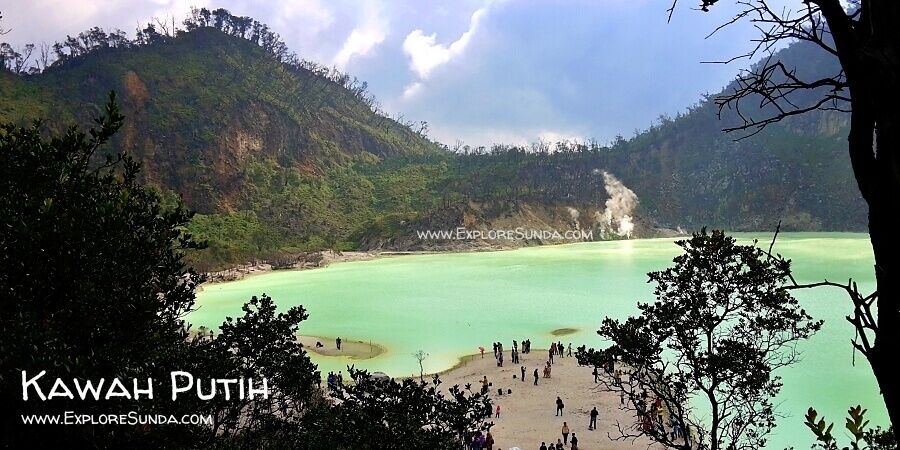 The view of Kawah Putih from the look out deck.
The view of Kawah Putih from the look out deck.Geography and History of Kawah Putih
Kawah Putih is one of the two craters of Mount Patuha (2,434 meters above sea level). The first crater was formed during an eruption in the tenth century and is located on the northwest side of the summit. The second crater, situated southeast of the first one, was created during an eruption in the twelfth century. Over time, this second crater filled with water and became a lake, which is today known as Kawah Putih.
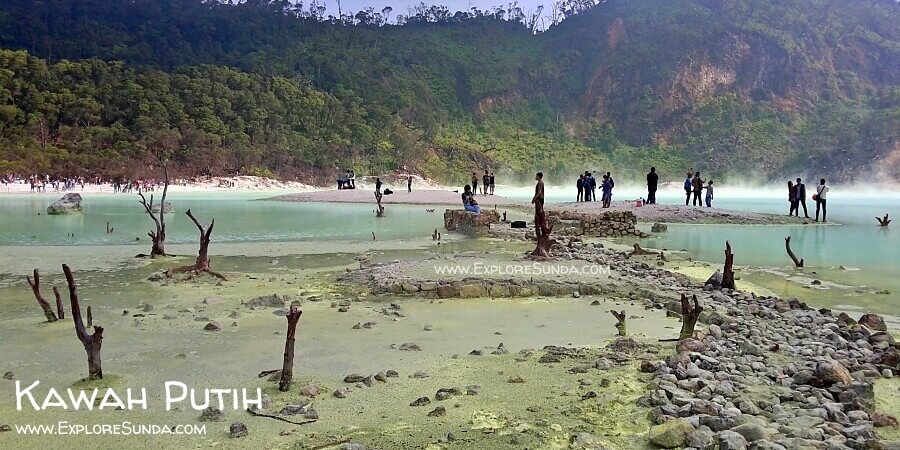 The sandbank of Kawah Putih is rich in sulfur.
The sandbank of Kawah Putih is rich in sulfur.The word Patuha originated from pak tua, which means an elderly male. This name was given to the mountain because it is believed to be the oldest mountain in the area. The locals also believed that the summit of Mount Patuha was a sacred place where the spirits of their ancestors used to gather. Because of this, nobody dared to venture there when Dr. Franz Wilhelm Junghuhn visited southern Bandung in 1837.
Mr. Junghuhn discovered that Mount Patuha had abundant sulfur. As a result, the Dutch built a sulfur factory named Zwavel Ontgining Kawah Putih. During the Japanese colonization, the name was changed to Kawah Putih Kenzanka Yokoya Ciwidey. Today, the factory has long gone, but the front entrance of the tunnel used to mine the sulfur is still there. Since people believe that sulfur is a cure for skin diseases, you will see many peddlers selling small packets of sulfur in this area.
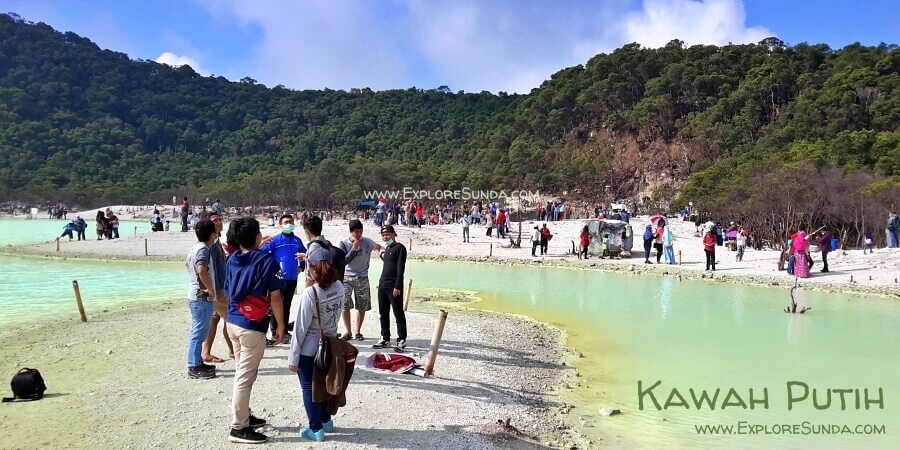 At the bottom of Kawah Putih lies a beautiful volcanic lake.
At the bottom of Kawah Putih lies a beautiful volcanic lake.Directions to Kawah Putih
Located on Mount Patuha, Kawah Putih is located between Ciwidey and Situ Patenggang. The GPS coordinates are 7°09'57.0"S 107°24’14.4” E.
Although public transportation is available to go to Kawah Putih, it requires several transfers and often involves long waiting times. Therefore, renting a car is the most convenient way to reach the destination. Moreover, you can park your car near the crater, which is another advantage of private cars.
The opening of the Soroja (Soreang - Pasirkoja) toll road has significantly reduced the travel time to Kawah Putih. You just need to drive until the end of Soroja, which takes less than half an hour from the exit of Pasirkoja toll road Bandung, to reach Soreang. Then, follow the directions to Ciwidey.
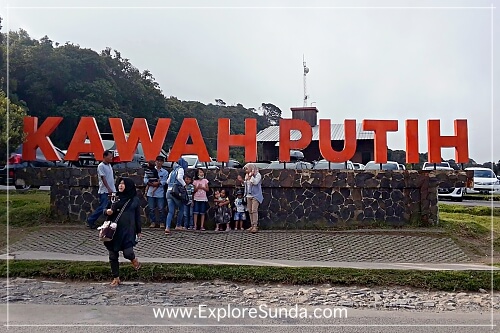 The upper parking lot of Kawah Putih.
The upper parking lot of Kawah Putih.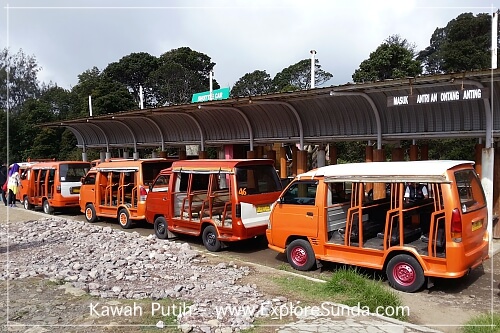 Ontang Anting, the shuttles that transport visitors from the lower to the upper parking lot.
Ontang Anting, the shuttles that transport visitors from the lower to the upper parking lot.Opening Hours:
7am-5pm
Ticket:
Rp.28,000 for Indonesian
Rp.81,000 for foreigners
Rp.15,000 car park near the entrance gate
or
Rp.162,000 car park near the crater
Ontang Anting (Shuttle):
Rp.29,000 per person
Slow down once you have passed Ciwidey Valley Resort. The entrance gate to Kawah Putih is on the left side of the road.
The crater itself is still five km uphill from the entrance gate. There are three options to reach the crater:
- You park near the entrance gate then take the shuttle called Ontang Anting. If you come by bus or motorcycle, you must park here too.
- You may also drive your car to the parking lot near the crater. This is the most comfortable option, but it is also more expensive.
All of these tickets are on top of the entrance tickets.
- Lastly, you can walk from the lower parking lot to the crater, but it will take much longer than the other two options and require much more effort since the road is uphill all the way. The good news is you can enjoy the beautiful scenery of the forest :)
Another popular destination in Ciwidey is Situ Patenggang, also known as Situ Patengan. It is a beautiful lake surrounded by a tea plantation. Presently, there are two tourist sites in Situ Patenggang, each with its own entrance. The first is Situ Patenggang, and the second is the newer Glamping Lake Side, located inside the Rancabali tea plantation.
As I mentioned earlier, the other most famous crater in Sunda is the Queen Crater of Mount Tangkuban Perahu. The other crater in this mountain is the Domas crater, where visitors can walk inside the crater and even boil some eggs.
- Sunda
- Mountain & Volcano
- Kawah Putih in Ciwidey
Recent Articles
-
Roro Jonggrang: A Tale Etched in the Stones of Prambanan Temple
Nov 05, 25 11:52 PM
Unravel the ancient Javanese legend of Roro Jonggrang that bridges myth, devotion, and the grandeur of Prambanan. -
Discover the Vibrant Celebration of Imlek in Indonesia!
Jan 13, 25 03:24 AM
The Chinese New Year of 2576 will be celebrated on January 29, 2025. Discover the special things in this Imlek festival! -
The Site Map of ExploreSunda.com
Nov 26, 24 10:40 PM
A thorough site map to help you browse through the Explore Sunda site.
